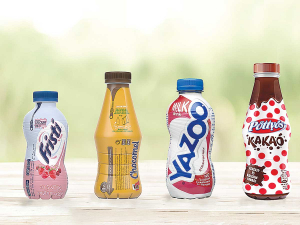EU dairy co-ops to merge
Two European dairy co-operatives are set to merge and create a €14 billion business.
 FrieslandCampina have announced they will adopt the use of fully recycled products for their products.
FrieslandCampina have announced they will adopt the use of fully recycled products for their products.
One of the world’s largest dairy cooperatives is moving to 100% recycled polyethylene terephthalate (PET) bottles from next month.
FrieslandCampina, Europe’s largest farmer-owned milk processor, has also developed a new ‘zipper’ that allows consumers to easily remove wrappers from PET bottles before putting them into recycling bins.
Patrick van Baal, global director packaging development at FrieslandCampina, says with the 100% recycled PET bottle, the co-operative is taking a new step in making its packaging circular.
“Our ambition is to become fully circular…that is why we are increasing the recycled content of our PET bottles from 20% to 100%,” he says.
“This step is crucial because in order to achieve our sustainability goals, all packaging must first become recyclable and/or reusable.”
This move makes FrieslandCampina the first company in the dairy sector to make its bottles virtually circular for its brands in the Netherlands, Belgium, the United Kingdom and Hungary.
Van Baal says one of the objectives of FrieslandCampina’s sustainability programme ‘Nourishing a Better Planet’ is to make the entire packaging portfolio sustainable and to reduce the amount of packaging materials to a minimum as well.
Five years ago the co-op switched to PET for all its drinking bottles because PET can potentially be made fully circular.
Also, unlike glass, it is lightweight and has a low carbon footprint. By making all new PET bottles from old PET bottles, FrieslandCampina will reduce production of about 1.9 million kilograms of new plastic.
Van Baal says the zipper will allow consumers to easily remove the label, so the bottle can be sorted and recycled much better.
“After your bottle has been discarded, it will go to a sorting centre,” says van Baal.
“The sorting is done by machines, and when the label is still on the bottle, the machine can’t ‘see’ the bottle underneath it.
“Besides, when the bottle and the label go to the recycling factory together, the inks and the material of the sleeve will mix with the transparent bottle material, making it less transparent and lowers the quality.”
He says labels are important and not only there “to be pretty”.
“It also covers the whole bottle and in that way keeps the light out of the bottle, keeping your product fresh for longer. Without the label the product would spoil quickly and we really don’t like food waste.”
Former Fonterra executive Alex Turnbull has been appointed CEO to lead all five Yili Oceania Business Division companies in New Zealand.
Fonterra executive René Dedoncker is leaving the co-operative later this year to lead Australian agribusiness Elders.
Alliance Group and the Southland Stags rugby team have joined forces in a partnership that will see the the meat co-operative's farmgate brand feature on players' team kits and replica jerseys.
Fonterra's plan to expand its organic programme to the South Island is being well received by farmers, the co-op says.
Voting has started for the renewal of DairyNZ's milksolids levy.
The most successful catchment groups in NZ are those that have 'a source to sea' approach.
OPINION: A dairy version of fantasy football has been launched.
OPINION: In recent weeks beaches in Auckland, Wellington and Christchurch have been unsafe to swim in because of recent heavy…